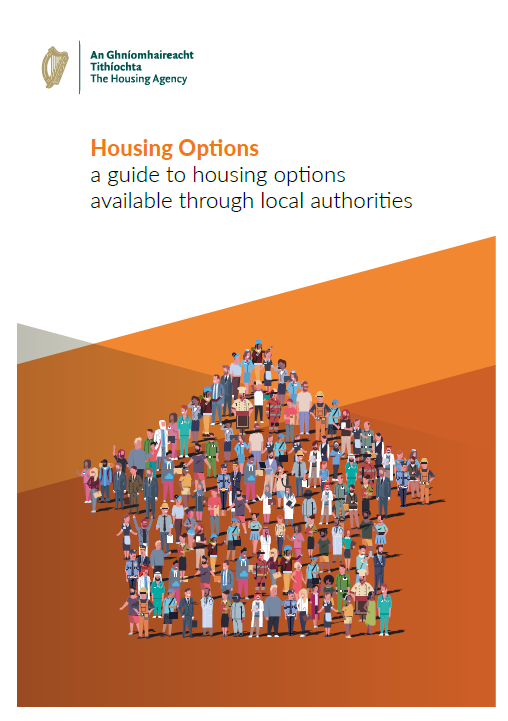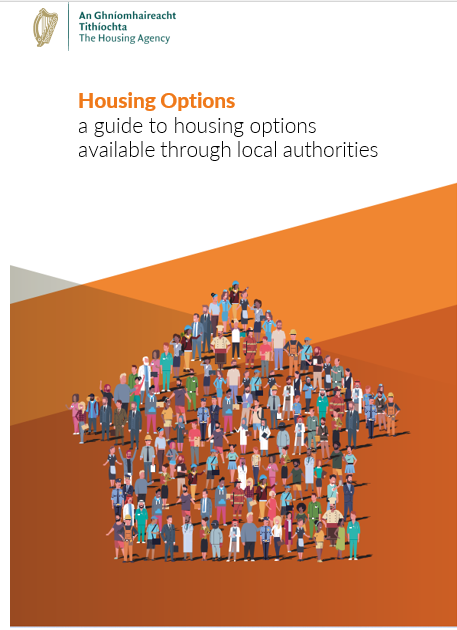There are many social housing options available through your local authority. Details about some of these options are available below.
The Housing Agency has also produced a number of guides to help you understand what options are available to you.


Local authorities continue to be the largest landlord in the country. It is expected that this will be the case for the foreseeable future. Local authorities will continue to manage their homes, including the allocations of vacancies that arise. As a tenant of a local authority, you pay a differential rent based on your income and ability to pay.
Local authority rents
Local authority rents are based on a system called ‘differential rents’. This means that the amount of rent you pay depends on the amount of your total household income.
- If your income is low, your rent payment will reflect this and will be low.
- If your income increases so will your rent payment.
- The income of all household members is considered and rent calculations are adjusted accordingly.
- If your income or the income of anyone in your household changes, you must inform the local authority and rent will be adjusted upwards or downwards in accordance to the change.
Each local authority operates its own rent scheme and you should contact your local authority to review the rent scheme it operates.
Local authority tenancy agreements
Once you accept accommodation, you enter into a tenancy agreement with your local authority. The conditions of your tenancy are set out in detail in the Letting Agreement. It sets out the general rules and terms of the tenancy such as:
- use of the property as your principle home
- how the rent is calculated by reference to the Differential Rents Scheme
- repair and maintenance responsibilities
- how to deal with disputes, anti-social behaviour and it usually sets out the consequences of not abiding by the terms of the tenancy.
More information on local authority tenancies is available on the Citizens Information Website.
Approved Housing Bodies (AHBs) have become a significant provider of social housing support. There are over 500 Approved Housing Bodies in Ireland providing over 35,000 homes across the country. The housing provided by these bodies include:
- General housing,
- Older person accommodation,
- Housing for people with disabilities, including mental health issues, and
- Homeless accommodation.
Some AHBs deal primarily with general housing provision, while others have a more specialised role. Some AHBs operate their allocations system through the local authorities, while some have their own system for allocating housing.
To avail of AHB-owned accommodation, an individual/household must qualify for social housing support with the local authority. The local authority will then nominate applicants to the AHBs in line with their allocation policy.
Approved Housing Bodies provide accommodation through:
- New build,
- Purchases, and
- Leasing in the private market.
While AHBs access private finance to fund some of their development/purchases, they also receive funding from the State through the local authorities under a number of schemes.
If you wish to be considered for housing provided by an AHB, you must indicate this by ticking the voluntary/co-operative housing box in Part 13 of the Social Housing Application Form. AHB tenants pay rent based on their income.
More information on AHBs is available on the Citizens Information Website
Housing Assistance Payment (HAP) is a form of social housing support provided by local authorities. HAP enables local authorities to provide housing support for households that qualify for social housing support in privately owned houses and who have a long-term housing need. Any household that is qualified for social housing support and is not already in receipt of another form of such support, is eligible for HAP.
If you qualify for HAP, your local authority will make a rent payment on your behalf directly to the landlord. You will pay a rent contribution to your local authority. Your contribution is a differential rent based on your income and ability to pay. If you get HAP and you start working, you will be able to stay in your home and continue receiving HAP. Your rent contribution may change if your income increases.
If your household has a short-term housing need, you will qualify for Rent Supplement, not HAP.
If HAP meets your housing need, you will be removed from the housing waiting list. You will still be able to apply for a transfer to housing owned by your local authority or a housing association. If you do this, your time on the housing waiting list will be considered on the transfer waiting list.
Download the 'Guide to the Housing Assistant Payment Tenant Guidebook' (easy to read version)
For more information on HAP, please contact your local authority or go to www.hap.ie
Some local authorities provide special accommodation for older people – usually community accommodation with special features, such as wardens and security cameras. Age limits for older people’s accommodation can vary depending on the local authority, but on average it is 55 years+.
You can contact your local authority for more information.
Long-term social leasing (10 years+), short-term leasing (4 years+) and the Rental Accommodation Scheme (RAS) (4–7 years) are social housing supports provided to households through the private sector. Landlords can put their properties forward for a period of 4 to 10 years and the local authority will nominate a household to that property. The tenant pays a differential rent to the local authority and the local authority will make payments to the landlord on behalf of the tenant.
Long and Short Term options are available to all people who qualify for social housing supports, including those moving from congregated settings, homeless people, Travellers and those residing in the community requiring housing on disability/medical grounds.
The Rental Accommodation Scheme caters for the accommodation needs of certain people who are getting long-term Rent Supplement.
To qualify, an applicant must be getting Rent Supplement for a minimum period of 18 months and be assessed as having a long-term housing need.
Information on RAS is available on the website of the Department of Housing, Planning and Local Government.
If you live in private accommodation – a home that is owned by a private landlord – you may be able to get Rent Supplement. You may qualify for Rent Supplement if you cannot pay the rent from your own resources such as your social welfare payments. If you have a short-term housing need you may be eligible for Rent Supplement.
Your Rent Supplement will be calculated to make sure that, after you pay rent, you have enough money left to live on.
Rent Supplement is provided by the Department of Employment Affairs and Social Protection. It is not provided by your local authority.
Rent Supplement is an income support. If you get Rent Supplement for a period longer than expected, your payment may be changed to a Housing Assistance Payment (HAP).
More information on Rent Supplement is available on the Citizens Information Website.
A range of accommodation options are available for Travellers. These include standard local authority housing, private rented or private housing assisted by a local authority or voluntary organisations. Traveller specific accommodation which receives 100% capital funding from the Department is also available, including group housing schemes and halting sites.
Caravan Loan Scheme
This scheme supports the provision of Traveller-specific accommodation through local authorities to provide preferential loans to Travellers to purchase their own caravan or mobile home on halting sites for use as their primary residence.
- Loans can be made to persons who the local authority deems in need of accommodation.
- Monthly loan repayments will be calculated at a preferential rate based on the price of the caravan/mobile home and the income of the household. The loan is for a set period of time which will be agreed in advance based on the expected life-cycle of the caravan/mobile home.
- The maximum amount of the loan is up to €40,000 inclusive of VAT.
- The owner of the caravan must provide 5% of the purchase price
More information on Traveller accommodation is available on the website of the Department of Housing, Planning and Local Government.
Home owners are the largest type of households in the country. To assist a person to remain in their own home the local authorities offer a number of grants.
The Housing Adaptation Grant Scheme
You may qualify for the Housing Adaptation Grant Scheme if you have a lasting disability that involves:
- Physical disability
- Sensory disability such as sight or hearing loss
- Mental health issue/s
- Intellectual impairment such as a learning disability.
The Housing Adaptation Grant is designed to help make your home more suitable for you to live in. The types of works covered include the fitting of access ramps, grab rails, downstairs toilet, stair-lifts, level access showers, changes to allow wheelchair access, extensions, and any other works which are reasonably necessary to make a house more suitable to live in. You will need to get a report from an occupational therapist (OT) that says you need these works done.
If your household income is more than €60,000 a year, you will not qualify for this grant. The maximum grant available is €30,000, which may cover up to 95% of the approved cost of works.
You must get approval for the grant before the work starts and payment of the grant is made when the work is completed.
More information on the Housing Adaptation Grant is available on the Citizens Information Website.
Mobility Aids Housing Grant Scheme
The Mobility Aids Housing Grant Scheme is available to fast-track grant aid to cover a basic suite of works to address mobility problems, primarily, but not exclusively, associated with ageing.
The Mobility Aids Housing Grant Scheme covers a basic range of works to address mobility problems, mainly for older people. You may also qualify for this grant if you have a disability. You will need to get a report from an occupational therapist (OT) that says you need these works done.
The works grant-aided under the scheme include:
- Grab-rails
- Access ramps
- Level access showers
- Stair-lifts
- Other minor work that helps you with mobility or helps a member of your household.
If your household income is more than €30,000 a year, you will not qualify for this grant. The maximum grant available is €6,000 or 100% of the approved net cost of works.
More information on the Mobility Aids Housing Grant Scheme is available on the Citizens Information Website.
Tenant Adaptation Works
If you are a local authority tenant and you have a disability, there is a scheme to help you adapt your home.
Before your local authority housing is adapted, your local authority will consider transferring you to more appropriate housing.
For more information on tenant adaptation works contact your local authority.
Housing Aid for Older People
The Housing Aid for Older People Grant Scheme helps older people who live in poor housing conditions to make necessary repairs or improvements to their home.
If you own your home or are buying it from your local authority under the Tenant Purchase Scheme, you may apply for this grant.
A number of repairs or improvements may be covered by this scheme and include:
- Re-roofing or roof repairs
- Rewiring
- Installing central heating if there is none
- Installing water and sanitary services such as toilets if there are none
- Repairing or replacing windows and doors
- Dry lining walls
- Making other repairs or improvements that the local authority considers necessary.
If your household income is more than €60,000 a year, you will not qualify for this grant.
More information on the Housing Aid for Older People Grant Scheme is available on the Citizens Information Website.